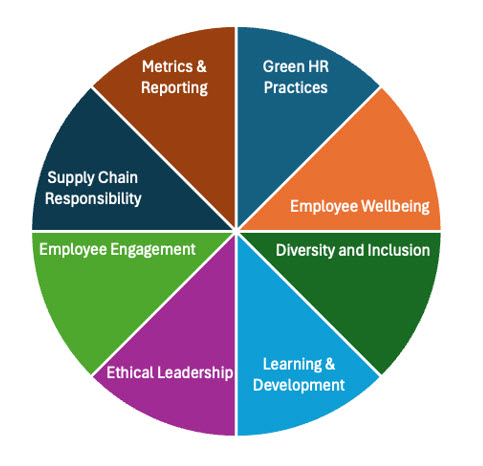Services
HR Sustainability
What is sustainability and how is this impacting society?
Sustainability is the quality of causing little or no environmental damage and, therefore, the ability to continue for a long time. It is a holistic approach that balances the three pillars of sustainability: economic, social, and environmental. This ensures society develops and progresses responsibly and creates a harmonious relationship between human activities and the earth’s ecosystems.
Climate change is upon us and has come about as a direct consequence of human activity via the emissions of gases we constantly pump into the atmosphere. Rising sea levels, rising temperatures and extreme, chaotic weather are clear signs of climate change.
These events will only become more severe unless we do something about it NOW.
To avoid a world-level catastrophe, Global Greenhouse Gas Emissions MUST be slashed in half by 2030 and reach NET ZERO by 2050 (when all GHG emissions released by humans are counterbalanced by removing GHGs from the atmosphere, known as carbon removal).
“What has happened to encourage a reduction in global emissions?”
“The results from COP21, December 2015 and COP28, November 2023?”
Participants from heads of state agreed to the climate change treaty to limit the global average temperature to well below 2°C above pre-industrial levels and pursue efforts ‘to limit the temperature increase to 1.5°C above pre-industrial levels’. As efforts were too slow, governments agreed to speed up the transition from fossil fuels (coal) to renewables. Investing in wind and solar power, clean energy, transitioning to electric cars, protecting our forests, planting trees, and reducing food loss and waste to reduce carbon footprint. Most countries worldwide have agreed to reach Net Zero emissions by 2050, and some aim to do so by 2030.
“Say no to global warming,
say yes to sustainability”
What is Sustainable HR?
Sustainable HR, also referred to as Green HR or Sustainable Human Resource Management, is an approach that integrates environmental sustainability principles into HR practices and strategies within organisations.
This approach acknowledges the impact of HR activities on environmental sustainability and aims to align HR practices with the organisation’s sustainability goals.
By integrating sustainability into the eight HR practices shown below, organisations can contribute to a more sustainable future, encourage a positive workplace culture, and attract socially conscious talent.
“Don’t let global warming melt away our future”
The Eight Practices in Sustainability
Green HR Practices – Revising energy efficiency by reducing paper with Digital automation. Practices & policies that reduce energy consumption.
Employee Wellbeing – Sustainable HR recognises the importance of work-life balance and employee well-being in promoting sustainability, incorporating flexible working arrangements and well-being programs.
Diversity & Inclusion – Inclusive recruitment and talent management practices foster a diverse workplace that attracts environmentally conscious employees.
Learning & Development – Ensuring staff growth and retention relies on robust Learning and Development initiatives. Integrate Skill Development for sustainability into training modules to equip employees with knowledge of environmental and social issues. Prioritise Leadership Development to cultivate leaders who incorporate sustainable practices into their decisions.
Ethical Leadership – Essential for embedding ethical and socially responsible practices into the company’s strategy and culture. This is reinforced by aCorporate Social Responsibility (CSR) Policy, focusing on transparency through the disclosure of environmental practices, sustainability goals, achievements, and challenges.
Employee Engagement – Sustainable HR fosters employee engagement and training by motivating employees to achieve sustainable goals. Translating environmental sustainability objectives into specific tasks and activities enhances engagement. Promoting environmental awareness campaigns and encouraging an “employee voice” empowers employees to contribute ideas for sustainability improvements.
Supply Chain Responsibility – Sustainable HR extends its reach beyond the organisation to the entire supply chain. It involves partnering with suppliers and contractors to implement sustainable practices throughout the value chain, such as using eco-friendly materials, reducing waste, and upholding ethical labour standards.
Metrics & Reporting – The organisation’s KPIs and metrics should include sustainable metrics to track practices. Transparent reporting ensures all stakeholders, including employees and the community, are informed about sustainability initiatives and outcomes. Carbon accounting tracks and reports the greenhouse gas emissions from business activities.
Get in Touch
Nuture Excellence with HR4Consulting’s Training & Development
At HR4Consulting, we understand the importance of fostering a positive work environment and promoting employee training and development. As your trusted HR partner, we believe that investing in your employees’ growth and skills is crucial for the success of your organisation.



